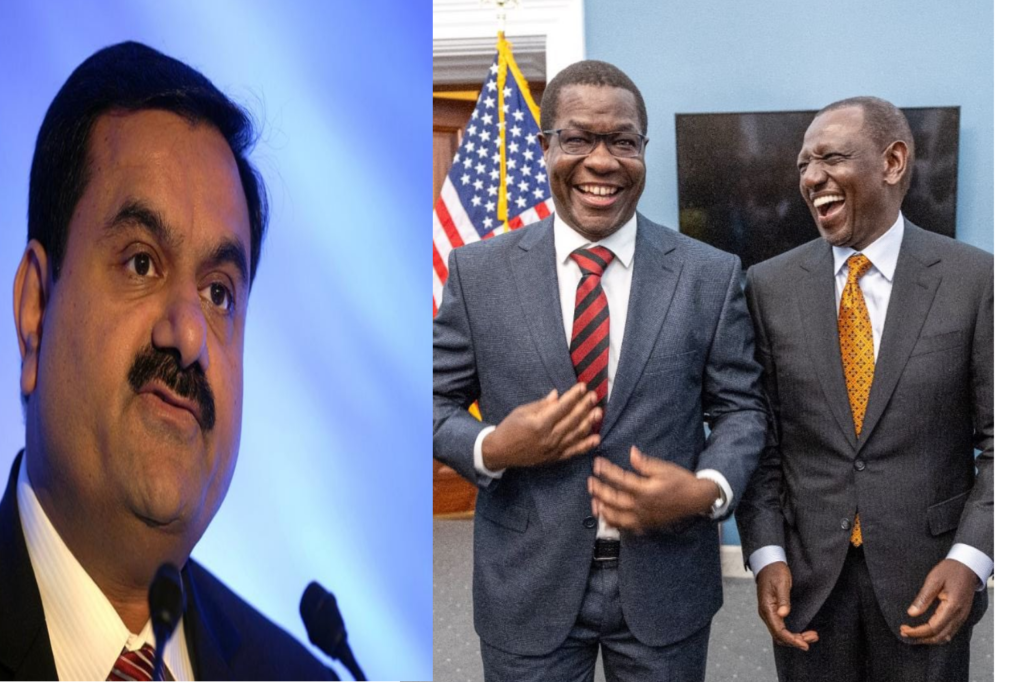
Introduction to the Situation
In recent developments, President William Ruto of Kenya has taken decisive action by canceling significant deals with the Adani Group, a multinational conglomerate based in India. This decision comes on the heels of a United States indictment against the company, a situation that has sparked considerable discourse within political and economic circles in Kenya. The implications of this cancellation resonate deeply, given the critical nature of these agreements for the Kenyan economy, particularly in areas such as infrastructure, energy, and investment.
The Adani Group had positioned itself as a key player in various sectors vital to Kenya’s growth, promising to boost job creation and enhance the nation’s economic landscape. Prior to the cancellation, these partnerships were viewed as opportunities to attract foreign investment and foster development. However, the U.S. indictment raises suspicions regarding the group’s business practices and ethical standards, casting a shadow over its operations, not only in Kenya but across global markets.
This recent turn of events underscores a growing trend where international legal matters intersect significantly with local economic affairs. Political leaders, such as President Ruto, must navigate these complexities carefully, as their decisions can set profound precedents that influence public trust and international relations. Additionally, this situation reveals the power of social media activism, which has played a crucial role in shaping public opinion and providing a platform for advocacy regarding ethical business practices. Consequently, the cancellation of the Adani Group deals marks not only an important moment in Kenya’s political landscape but also serves as a reflection of how global actions can impact national interests.
Understanding the Role of Social Media Activism
In recent years, social media activism has emerged as a powerful tool for citizens seeking to influence political decisions and hold governments accountable. With platforms like Twitter, Facebook, and Instagram enabling individuals to share their thoughts and engage with larger communities, activists can mobilize support in ways that were previously unimaginable. This proliferation of digital activism has significantly altered the global political landscape, particularly in developing nations where traditional forms of activism may be less effective.
The ability to rapidly disseminate information and galvanize public support through social media has propelled various movements into the global spotlight. For example, campaigns such as #MeToo and #BlackLivesMatter illustrate how social media can effectively raise awareness about critical social issues and inspire collective action. These movements not only foster dialogue but can also compel governments to take action, as seen in the mandate for reform and accountability in several regions.
In Kenya, the recent engagement of citizens on social media platforms has illustrated the power of public sentiment in influencing governmental decisions. Mass mobilizations around issues such as corruption, environmental protection, and human rights have shown that a widespread online presence can lead to tangible outcomes. The cancellation of contracts with the Adani Group by President Ruto is a prime example, as online discourse and activism highlighted citizens’ concerns regarding governance and fiscal responsibility. This incident underscores how the voice of the people, amplified through social media, can prompt government responses.
Furthermore, the interconnectedness afforded by social media allows activists to draw support from a global audience, amplifying local issues into international conversations. This shift towards digital engagement denotes a growing trend where government actions are increasingly scrutinized, leading to demands for transparency and accountability. As different social movements continue to wield significant influence, it becomes evident that social media activism is reshaping political processes worldwide.
The Reaction from Kenyans and Experts
The announcement by President Ruto to cancel the Adani Group deals has elicited a diverse range of reactions among Kenyans, spanning across different sectors of society. Politicians, activists, and ordinary citizens have taken to social media platforms to express their views, reflecting a public sentiment that is both supportive and critical of the decision. Many supporters believe that the President’s move is a step towards governmental accountability and reinforces the importance of integrity in business dealings. These individuals argue that the cancellation signals to both local and foreign investors that Kenya prioritizes ethical standards and will not tolerate associations with entities facing legal challenges, particularly those viewed as detrimental to the nation’s image.
Conversely, there are members of the public and specific political factions who express concern over the potential economic repercussions of this cancellation. Critics argue that the abrupt halting of such substantial deals could deter future investments and sabotage ongoing development projects within the country. Especially within the economic contexts, some stakeholders fear that this action may lead to job losses and stall infrastructural advancements that the Adani Group was poised to support. This divide in opinions underscores the complexity of governance where economic necessities might clash with ethical considerations.
Insights from political analysts and economic experts add another layer to the discussion. Many believe that social media has played a significant role in amplifying public discourse around this issue. The rapid dissemination of information and sentiments on platforms like Twitter and Facebook has enabled citizens to organize and vocalize their opinions more effectively than ever before. Experts suggest that this digital activism may have pressured the government to reconsider its affiliations with corporations entangled in legal controversies. The intersection of social media and governance illustrates a potent shift in how public sentiment can influence policy decisions in Kenya’s political landscape.
Future Implications and Lessons Learned
The recent decision by President Ruto to cancel deals involving the Adani Group following a US indictment serves as a critical case study in the intersection of governance, corporate accountability, and social media activism. The implications of this decision may resonate throughout Kenya’s political landscape, potentially heralding a shift toward increased transparency and civic engagement. With social media playing a pivotal role in disseminating information and mobilizing public opinion, the potential for collective activism to influence government actions has never been greater.
One potential long-term consequence of this scenario is the heightened expectation for transparency among government officials. Citizens are likely to demand clearer accountability measures, as seen in the public backlash against perceived malfeasance in political dealings. This expectation may also encourage leaders to adopt more transparent policies, thus fostering a political culture where decisions are made with the public interest in mind. Furthermore, the Adani case underscores the importance of due diligence in business relationships, suggesting that future agreements may come under increased scrutiny from both the public and regulatory bodies to prevent ethical or legal controversies.
The engagement of the public through social media platforms has become an essential element of modern governance in Kenya. The ability to quickly disseminate information allows citizens to stay informed and engaged, promoting a more active citizenship that can advocate for changes in policies. As knowledge becomes more accessible, citizens may feel empowered to hold their leaders accountable, thereby shifting the power dynamic between the governed and those in power. It is reasonable to speculate that the interactions between social media influencers and traditional political entities will continue to evolve, potentially leading to partnerships that further enhance civic participation.
In conclusion, the lessons gained from President Ruto’s decisions concerning the Adani Group highlight the pivotal nature of accountability and transparency in governance. As social media continues to reshape the landscape of political engagement, it will be crucial for both citizens and officials to adapt to these changes, ensuring that accountability remains at the forefront of political processes in Kenya.






